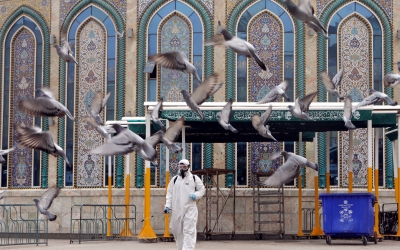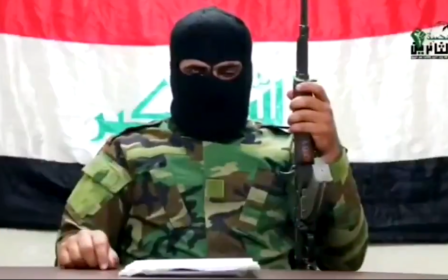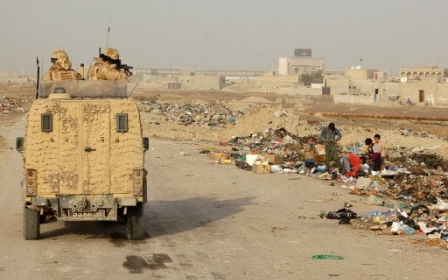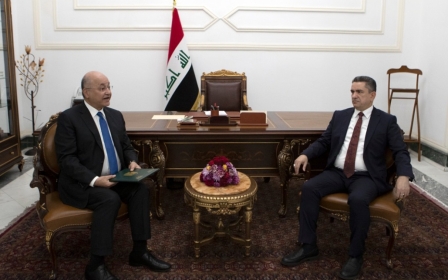Iraq's pro-US PM-designate faces challenge from Iran-backed factions
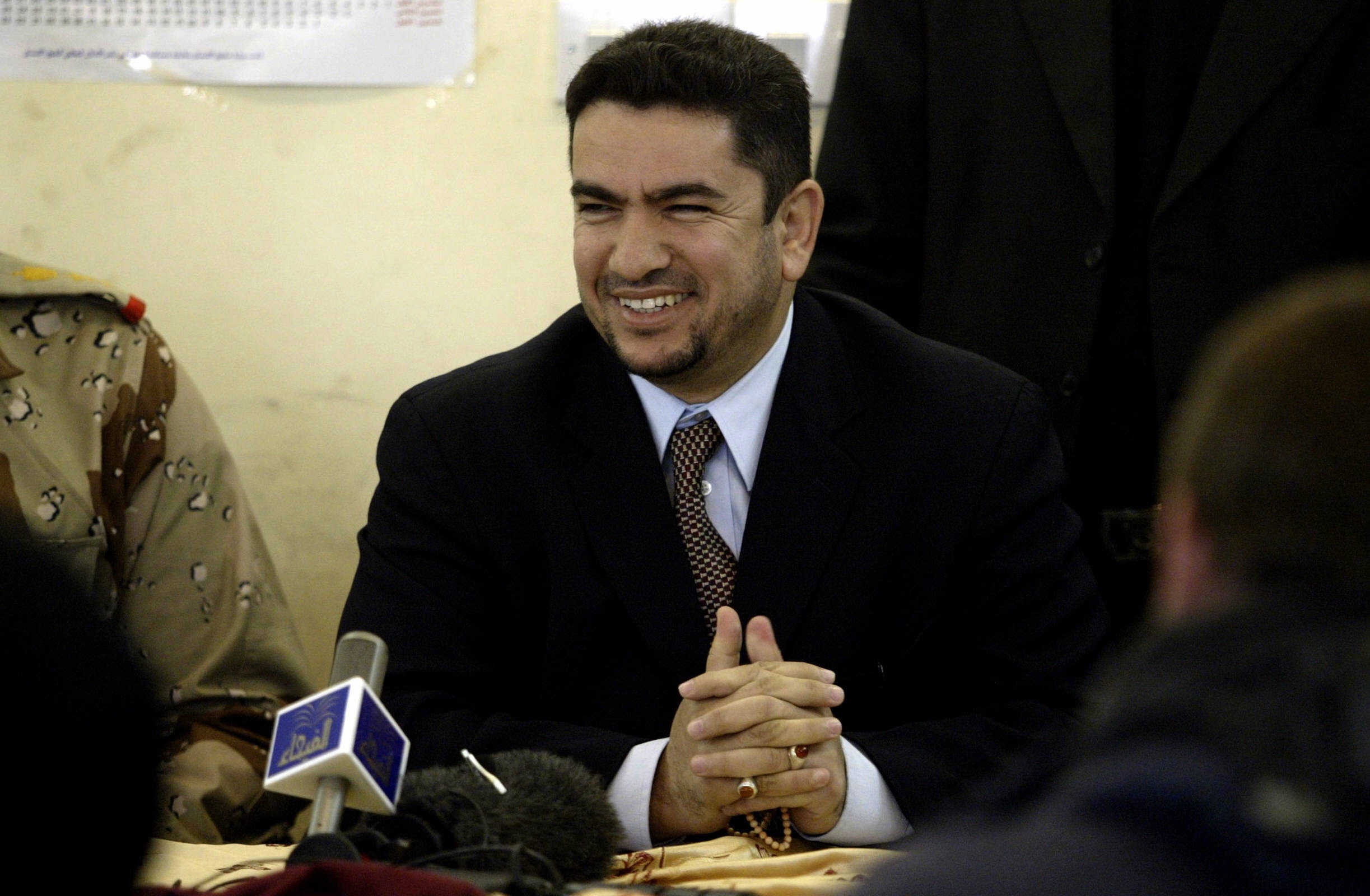
The recent nomination of a pro-US prime minister-designate in Iraq has raised political tension with the country's pro-Iran political factions in the past week, at a time when tensions between Tehran and Washington remain extremely high.
Adnan al-Zurfi, the former governor of Najaf, was chosen by President Barham Salih on Tuesday to be the latest candidate to try to form a government after Mohammed Tawfik Allawi's ill-fated attempt collapsed in early March.
As if Zurfi's bid - scuppered by disagreements among Iraq's political factions - wasn't difficult enough, he will have to deal with the coronavirus pandemic hitting Iraq, collapsing oil prices, and an ongoing anti-government protest movement hostile to establishment politicians.
Zurfi's appointment has already provoked a backlash from political organisations close to Iran, who see the dual Iraqi-American citizen as beholden to US interests.
Several Shia parliamentary groups reportedly met at the home of Ammar al-Hakim, leader of al-Hikma movement which backs Zurfi, on Thursday evening to discuss their response to his appointment.
New MEE newsletter: Jerusalem Dispatch
Sign up to get the latest insights and analysis on Israel-Palestine, alongside Turkey Unpacked and other MEE newsletters
However, those attending "did not reach any final decision," an Iraqi MP who attended told Rudaw news agency.
The Fatah coalition, a group of largely pro-Iran politicians that make up one of the largest parliamentary groups, are leading the opposition against Zurfi, calling his appointment "unconstitutional" for not seeking political consensus.
“The president of the republic shall endure full responsibility for the repercussions of this provocative step," Fatah said in a statement. “We will take all measures to prevent this disregard of the law and constitution."
In addition to the Hikma movement, the Nasr coalition of former prime minister Haider al-Abadi - of which Zurfi has been a member since 2018 - and the Patriotic Union of Kurdistan (PUK) have come out in support of the PM-designate.
Neither the Kurdistan Democratic Party nor Sunni parties have publicly declared their positions.
Room for hope?
Despite all the challenges and the hostility from some political factions, Sajad Jiyad, a Baghdad-based analyst, suggests there are reasons to think Zurfi could be more successful than his immediate predecessor.
“He’s more pragmatic. Probably more charismatic as well. And he’s got the benefit of hindsight, he’ll have learnt the lessons from the last nomination, you have to win the blocs over, you need the votes," he explained.
Opposition from the heads of the major parliamentary bloc may not necessarily translate to opposition within their ranks, Jiyad said. Zurfi remains popular with many MPs who would vote for him despite the official policies of their leaders.
“I wouldn’t think Salih would have appointed him if he thought there was a lot of opposition," Jiyad said. "He's probably likely to pick up the votes and amongst the bloc leaders most of them will come round. There may be opposition still but the majority will come round."
He added: “Iraq really can’t afford to be without leadership.”
America's man?
Compared to any of the previous four prime ministers of Iraq, Zurfi has arguably the most unabashedly pro-US credentials.
On Thursday, David Schenker, US Assistant Secretary of State for Near East Affairs, said the US endorsed Zurfi and was supportive of a politician that "supports Iraqi sovereignty".
He added that the US was "hoping that pro-Iran parties - that is, Iran and its allies - do not move to scuttle the nomination".
Zurfi spent more than a decade in exile living in Chicago and Michigan in the 1990s. He returned to Iraq after the overthrow of Saddam Hussein to work for the Coalition Provisional Authority (CPA) established in 2003 by the US-led coalition.
In 2004, he was appointed governor of Najaf by CPA head Paul Bremer, and in the 10 or so years he spent in the role became a fierce opponent of the armed militias that controlled much of the country during the period.
'[Muqtada] al-Sadr hasn’t forgotten that there’s blood between those two going back to 2004 and years after'
- Sajad Jiyad, analyst
He has remained a vocal opponent of armed groups existing outside the control of the state, and opposed a parliamentary vote in January calling on US troops to withdraw from Iraq.
Should he form a government, he will have to deal with an escalating proxy conflict between Iran-backed militias and US forces which has seen numerous death and injuries in recent weeks.
Muhammed Hussain Jassem, an Iraq researcher at Integrity UK, told Middle East Eye that Salih's decision to appoint Zurfi could stem from a desire to de-escalate the violence.
"Salih may have believed that the best way for the country to not get dragged into a further conflict with the US, is by designating someone favourable [to them], who can try and have a detente period with the US," he explained.
He added that, despite Zurfi's reputation as an opponent of armed groups existing outside of the state, he had expressed his support of the state-backed Hashd al-Shaabi paramilitaries, which were created in 2014 and are composed of a mixture of volunteer fighters and long-established armed groups.
"Furthermore, Zurfi, as a shrewd individual, will not try and create more enemies at the time," Jassem said.
"Thus while he may side with the US more generally speaking, he will try and frame it as strengthening sovereignty against any future transgressions."
During his tenure as governor, one of his fiercest opponents was Muqtada al-Sadr and his Mahdi Army, who launched an armed insurgency against the US occupation in 2004.
Despite this, the Sairoun coalition - which is largely composed of Sadr supporters - is backing Zurfi's appointment, although Sadr himself has been publicly lukewarm.
In a tweet following the announcement, the influential cleric said he was "not going to give an opinion about this candidate or others" but said his only concern was the "sovereignty of Iraq".
Jiyad said that although relations between Zurfi and Sadr were repaired around 2014 and 2015, "they weren’t repaired to a huge level of trust".
“Sadr hasn’t forgotten that there’s blood between those two going back to 2004 and years after," he explained.
Oil, coronavirus and protests
The role of prime minister of Iraq is never an easy one, least of all now.
Crashing oil prices mean that the government's main source of revenue, in a country where the majority of people work in the public sector, could dry up.
The protest movement, which has been ongoing since October and which has already rejected Zurfi's nomination, continues to call for a political overhaul.
And the coronavirus pandemic, which has sent much of the world into panic and lockdown, threatens to buckle Iraq's already highly stretched medical resources.
As of Friday, 192 cases were confirmed in the country, with 13 deaths, according to the health ministry.
The current outgoing government has responsibility for the crisis as it stands, but if Zurfi is successful in forming a new government within 30 days, the burden will fall on his shoulders.
"If Iraq can actually enforce the curfew and take preventative measures, to prevent the spread of coronavirus, he may not have to deal with it in 30 days," said Jassem.
"However, given that the Iraqi government cannot cope medically and has not been able to enforce the curfews effectively, Zurfi’s challenge will double, as most people will ignore the oil price crash and demand immediate solutions for the coronavirus outbreak."
Jassem added: "He is definitely not in an enviable position."
Middle East Eye delivers independent and unrivalled coverage and analysis of the Middle East, North Africa and beyond. To learn more about republishing this content and the associated fees, please fill out this form. More about MEE can be found here.


